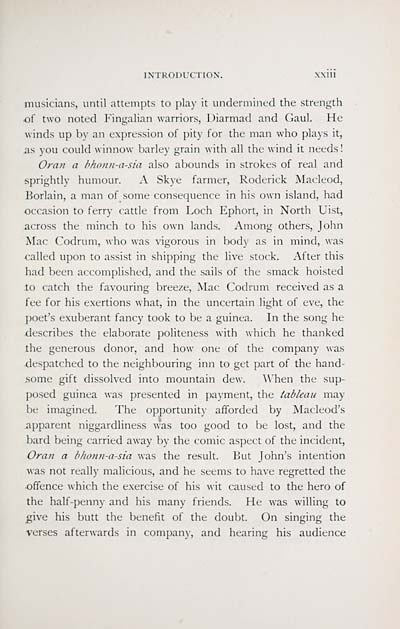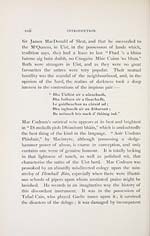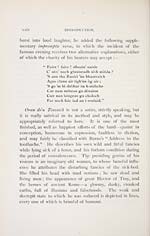Hew Morrison Collection > Poems and songs of John MacCodrum, Archibald MacDonald, and some of the minor Uist bards
(41)
Download files
Complete book:
Individual page:
Thumbnail gallery: Grid view | List view

INTRODUCTION. XXlll
imisu ians, until attempts to play it undermined the strength
of two noted Fingalian warriors, Diarmad and Gaul. He
winds up by an expression of pity for the man who plays it,
as you could winnow barley grain with all the wind it needs !
Oran a bhonii-a-sia also abounds in strokes of real and
sprightly humour. A Skye farmer, Roderick Macleod,
Borlain, a man of some consequence in his own island, had
occasion to ferry cattle from Loch Ephort, in North Uist,
across the minch to his own lands. Among others, John
Mac Codrum, who was vigorous in bod)- as in mind, was
called upon to assist in shipping the live stock. After this
had been accomplished, and the sails of the smack hoisted
to catch the favouring breeze, Mac Codrum received as a
fee for his exertions what, in the uncertain light of eve, the
])oet's exuberant fancy took to be a guinea. In the song he
describes the elaborate politeness with which he thanked
the generous donor, and how one of the company was
despatched to the neighbouring inn to get part of the hand-
some gift dissolved into mountain dew. When the sup-
posed guinea was presented in payment, the tableau may
be imagined. The opportunity afforded by Macleod's
apparent niggardliness was too good to l)e lost, and the
bard being carried away by the comic aspect of the incident,
Orait a bhonn-a-sia was the result. But John's intention
was not really malicious, and he seems to have regretted the
offence which the exercise of his wit caused to the hero of
the half-penny and his many friends. He was willing to
j^ive his butt the benefit of the doubt. On singing the
verses afterwards in company, and hearing his audience
imisu ians, until attempts to play it undermined the strength
of two noted Fingalian warriors, Diarmad and Gaul. He
winds up by an expression of pity for the man who plays it,
as you could winnow barley grain with all the wind it needs !
Oran a bhonii-a-sia also abounds in strokes of real and
sprightly humour. A Skye farmer, Roderick Macleod,
Borlain, a man of some consequence in his own island, had
occasion to ferry cattle from Loch Ephort, in North Uist,
across the minch to his own lands. Among others, John
Mac Codrum, who was vigorous in bod)- as in mind, was
called upon to assist in shipping the live stock. After this
had been accomplished, and the sails of the smack hoisted
to catch the favouring breeze, Mac Codrum received as a
fee for his exertions what, in the uncertain light of eve, the
])oet's exuberant fancy took to be a guinea. In the song he
describes the elaborate politeness with which he thanked
the generous donor, and how one of the company was
despatched to the neighbouring inn to get part of the hand-
some gift dissolved into mountain dew. When the sup-
posed guinea was presented in payment, the tableau may
be imagined. The opportunity afforded by Macleod's
apparent niggardliness was too good to l)e lost, and the
bard being carried away by the comic aspect of the incident,
Orait a bhonn-a-sia was the result. But John's intention
was not really malicious, and he seems to have regretted the
offence which the exercise of his wit caused to the hero of
the half-penny and his many friends. He was willing to
j^ive his butt the benefit of the doubt. On singing the
verses afterwards in company, and hearing his audience
Set display mode to: Large image | Transcription
Images and transcriptions on this page, including medium image downloads, may be used under the Creative Commons Attribution 4.0 International Licence unless otherwise stated. ![]()
| Early Gaelic Book Collections > Hew Morrison Collection > Poems and songs of John MacCodrum, Archibald MacDonald, and some of the minor Uist bards > (41) |
|---|
| Permanent URL | https://digital.nls.uk/81340255 |
|---|
| Description | A selection of items from a collection of 320 volumes and 30 pamphlets of literary and religious works in Scottish Gaelic. From the personal library of Hew Morrison, the first City Librarian of Edinburgh. |
|---|
| Description | Selected items from five 'Special and Named Printed Collections'. Includes books in Gaelic and other Celtic languages, works about the Gaels, their languages, literature, culture and history. |
|---|

